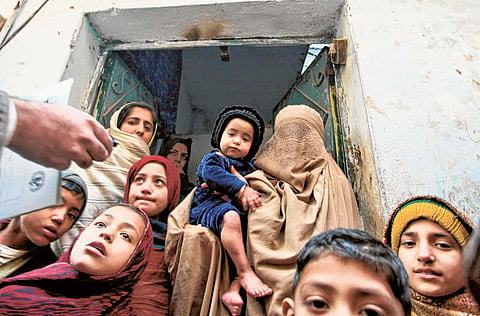Polio figures crippling Pakistan economy
Pakistan was only country to record an increase in cases in 2010, according to WHO

Peshawar: Tiny Shamsa is a victim of the war against Islamist militants in northwest Pakistan, but it wasn't bullets or bombs that paralysed her right leg.
The 18-month-old contracted polio after fighting blocked vaccination teams from reaching her village.
In a country with no shortage of alarming statistics, here is another: Pakistan was the only country in 2010 to record an increase in cases of the crippling disease — 138, up from 89 in the previous year, according to World Health Organisation (WHO) figures.
That made it the nation with the highest incidence of polio in the world.
Most cases were in the northwest close to the Afghan border, where battles between the US-supported Pakistani army and Taliban fighters make many areas too dangerous to visit.
The army bans travel to parts of the region, citing the security situation, and territory under militant control is highly dangerous for outsiders, even Pakistani aid workers.
Controversies
In 2009, one Pakistan Taliban commander declared the vaccine un-Islamic, echoing a few conservative clerics in other Muslim countries. But others have not publicly stated any objections.
In Afghanistan, the Taliban cooperate with health workers administering the vaccine, in part because doing so adds to the movement's legitimacy.
Polio was eradicated generations ago from the Western world, but remains endemic in Pakistan, neighbouring Afghanistan and India, as well as Nigeria. Sometimes fatal and highly contagious, it can be prevented with a few drops of vaccine.
Eradication needs a comprehensive vaccination campaign. Missing even a single child can mean the disease reappearing.
In 2010, India recorded 41 cases, Afghanistan 24 and Nigeria 18, according to WHO. A WHO-backed campaign, which began in 1988, aims to eradicate polio from Pakistan by the end of 2011. But some doctors say privately that the target will not be met.
"It is upsetting to know that our only child could not get vaccine because of the troubles," Shamsa's mother, Majeeda Ali, said at a hospital in the main northwestern city of Peshawar where she took her daughter for treatment recently. "Yes, I am angry."
Workers from the United Nation's children's agency, which is helping administer the vaccine, say they have not been able to access Shamsa's village in the Khyber region for almost two years because of intensified Pakistan military efforts to rid the region of Al Qaida and Taliban militants. Shamsa caught polio last year.
WHO director-general Margaret Chan raised the effect of the conflict on the worsening polio rate in October last year during a meeting with President Asif Ali Zardari.
Sign up for the Daily Briefing
Get the latest news and updates straight to your inbox



